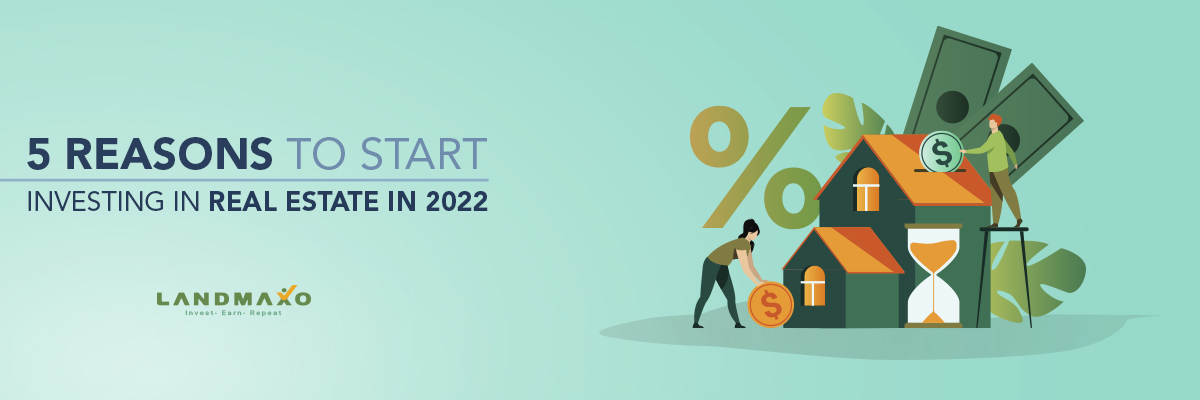
Nov, 07 2022
Different Types of Real Estate Investments
If you play your cards right and make smart investments based on your financial assets, real estate could be a great benefit to you! It is a great source of passive income and a lifetime investment for the future.
If you are investing for the first time, you might find it a bit overwhelming to choose the right type of plan. There are so many different types of real estate investments to choose from and you need to know how they work.
Read on to know the different types of investments in real estate and which ones might suit your needs!
General categories
To begin with, let’s divide real estate investment into two broad categories - active and passive. Active investments are more expensive and risky compared to passive ones. It can be quite lucrative for investors as it involves much more than just buying a house, repairing it, and renting it out to tenants.
You must also consider the time, labor, and money that goes into choosing a property that is in high demand and maintaining it. You must always think in terms of the long run and manage residential properties with care.
It also helps to know when to opt for property flipping, blanket mortgages, or fractional investment. These are strategies based on how much you are willing to invest and how many properties you wish to own.
On the other hand, passive income refers to when you don’t own the property or manage it directly. You could be investing in a real estate trust or fund and engage in crowdfunding activities. This means that you needn’t pay the money upfront or manage anything firsthand.
Residential real estate
This is the most common form of investment as it is active and not passive. You need to put in a lot of manual labor and money to generate cash flows. However, they yield good results in the long run and you can cherish the continuous profits later.
It could include properties you rent out to tenants after refurbishing them. As the value of the property appreciates, so will your monthly income. You could also rent out land for a short period such as vacation rentals to tourists. They will pay you for however long they choose to stay at your property.
You might also have an Accessory Dwelling Unit (ADU) to accommodate a tenant in your space. For example, renting out one of the floors in your house to some other family or converting your shed into a small home.
A common strategy for residential properties is property flipping. This is when you purchase a property for cheap when it needs repairs and fix it for a nominal price. You can then sell it to someone else for a much higher price!
Commercial real estate
This refers to properties that are not residential. It could be a mall, hotel, warehouse, piece of farm land, retail stores, or office spaces. In this form as well, you can rent out the space to someone or sell it when the value grows.
The benefit is this form of investment yields more returns than residential properties and can grow in value faster. If you can find a property in an area that is in high demand, you can sell it quickly or charge more than what you purchased it for.
People who are just starting to invest in real estate tend to prefer this kind of property as they can build professional contacts effectively. The commercial spaces will mostly be rented by businessmen or corporates. Your tenants will be professional and more likely to pay their rent on time.
Real Estate Invesment Trusts (REITs)
This refers to passive income models where you invest in a trust and benefit indirectly from them. REITs are companies that operate as trusts and help investors generate an income from the properties the company manages.
They oversee a variety of real estate investments and have several investors pooling in their money. The companies specialize in public properties such as offices, malls, hotels, hospitals, and so on.
This is a good option for people nearing their retirement. They need not manage or oversee the properties by themselves and can invest a small amount. They will earn a passive income regularly despite not having any capital of their own.
You can earn an income with minimal risks without even seeing or owning a property under your name! You will have a diverse portfolio with high rates of liquidity. Despite having continuous but small amounts every month, your future income will keep rising if you stay consistent.
Crowdfunding
This is a strategy wherein many investors pool together their money to buy properties they might not be able to buy alone. It is ideal if you don’t have a large sum of money to invest upfront and wish to be more passive in income style.
You can diversify your portfolio here as well since you needn’t personally manage any properties. It is mostly online and you can work within your comfort zone without having to collaborate with other investors.
One possible drawback is having to pay the crowdfunding platform for the services they provide. They might charge a user fee for using them which is usually affordable and good for first time investors.
Let’s sum up
These are some of the most common types of real estate investments. Based on how much money you are ready to invest and how long you can stay in the game, you can pick a plan for yourself!
Keep in mind that risks and drawbacks are everywhere - no matter what strategy you pick, there will be consequences accordingly. It is vital to assess your financial situation and futuristic goals to pick the best investment style.
To know more about picking the best plan for your customized needs, click here.





